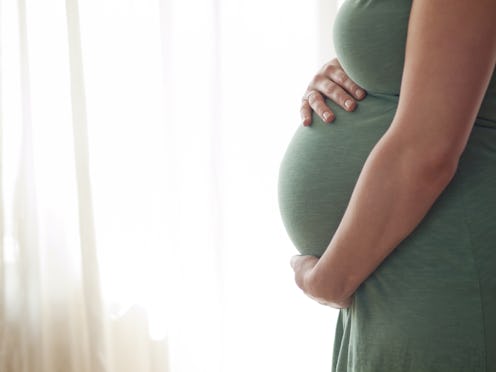News
Are Antidepressants Safe During Pregnancy?

Seeing those two little pink lines always brings with it a ton of emotions and a flood of questions, all at once. But for women who suffer from depression, there's one more question they're suddenly faced with: Is it safe to keep taking my antidepressants? There's never really been an official answer, but according to a new study published in the American Journal of Psychiatry, we may finally be inching closer to one. Finnish researchers say that, actually, taking antidepressants lowers the risk of pregnancy complications, but it also could increase the risk of neonatal complications after the baby is born.
"To our knowledge, the association between taking antidepressants in pregnancy and a lower risk of preterm birth is a novel finding," wrote senior author Dr. Alan Brown in the study results. Brown is a professor of psychiatry and epidemiology at Columbia University Medical Center in New York, NY. "Up to now," he continued, "studies which were based on maternal underlying psychiatric illness had small sample sizes and reported inconsistent results." (In contrast, this study referenced a generous sample size of over 800,000.)
To put things in perspective, prenatal depression affects around 13 percent of new mothers; which is a relatively small, but significant number that makes the dilemma over taking antidepressants a very sobering one. Selective serotonin re-uptake inhibitors (or SSRIs), are the most commonly prescribed form of antidepressants, which basically work by increasing serotonin levels in the brain and increasing a person's mood.
For this study, researchers pulled 845,345 birth records from the Finnish Medical Birth Register between 1996 and 2010, and combed through related data on each birth, including the mother's psychiatric history, medical history, and prescription drug use. While previous studies have linked prenatal depression to low birth weight and preterm labor, the researchers wanted to compare those specific risks for women who were medicated and those who were not.
In the end, they turned up two major findings that definitely made a case for taking SSRIs. First, when looking at the cases of mothers diagnosed with a psychiatric condition, the risk of preterm birth for SSRI users was found to be 16 percent lower than those who did not. And then there was this: The risk of extreme preterm birth was nearly 50 percent lower among women using the medication compared to those who didn't. One other interesting finding? Women with psychiatric disorders who didn't take SSRIs were more likely to need a c-section. However, there was one major drawback: SSRI use was also linked to an increase rate of neonatal complications, including trouble breathing. And these complications weren't minor, either — in many cases, they led to longer hospital stays and closer monitoring.
The research comes right on the heels of another similar study conducted just last month, which looked at the rate of birth defects caused by popular antidepressants. In that study, researchers found no link between birth defects and the most commonly used antidepressant, sertraline (Zoloft), which 40 percent of participants reported taking regularly. The same was found to be true of citalopram (Celexa) and escitalopram (Lexapro). However, when it came to fluoxetine (Prozac) and paroxetine (Paxil), the drugs were associated with several serious infant abnormalities: heart defects, abdominal wall defects, and missing brain and skull defects with paroxetine; and heart wall defects and irregular skull shape with fluoxetine. Depending on the defect and the medication, the relative risk increased 2 to 3.5 times.
Adding to the antidepressant dilemma is also what long-term effects SSRI use places on the baby, if any. Andrew Solomon, author of The Noonday Demon: An Atlas of Depression, has closely studied prenatal depression for years, and even wrote about it in his recent New York Times article, "The Secret Sadness of Pregnancy With Depression." Speaking with NPR last month, he said, "The jury is still out on what happens in a developing brain and whether those people, as they get into adulthood, will have slight shifts in their personality or consciousness or their vulnerability to depression on the basis of their prenatal exposure."
But then of course, there's the flip-side of the argument: Is the mother's depression so great that not taking medicine while pregnant poses an even greater risk?
"Women who are depressed are less likely to keep all of their obstetrical appointments, are more likely to drink or use substances of abuse, are less likely to regulate their exercise and what they eat in the ways that are best for a developing fetus," Solomon told NPR. "It's harder to be good at pregnancy when you're depressed."
In the end, researchers arrived at more or less the same conclusion we've heard a million times: "Given these divergent findings, the decision whether to prescribe these medications during pregnancy should be individualized to the mother's medical and psychiatric history," they wrote in their conclusion. Though however indefinite that answer may sound now, the study definitely brought with it some key takeaways — and they will certainly help to inform researchers, doctors, and drug manufacturers looking to improve SSRI outcomes in the future.